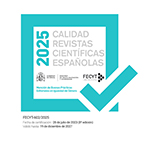Wikileaks: transparencia total. Límites y posibilidades de una demanda utópica
Resumen
El affaire Wikileaks ha puesto sobre la mesa la idea de transparencia social y política en sociedades complejas como las nuestras. No resulta fácil dilucidar los alcances de tal concepto. ¿Qué entraña exactamente esa clase de transparencia? ¿Cómo se mide el grado de opacidad de una sociedad? ¿Es realista pedir una transparencia completa al Estado y sus organismos? ¿Es posible abolir el secreto? ¿Hasta dónde se puede satisfacer esta demanda? ¿Suponen las filtraciones de Wikileaks un mojón en la marcha de la Humanidad hacia una mayor transparencia, como afirman sus partidarios? Tales son algunos interrogantes planteados por el fenómeno Wikileaks a los que este trabajo intenta aproximar una respuesta. Con ese propósito hemos reconstruido la andadura histórica del concepto de transparencia, para luego abordar su ubicación en el sistema de la comunicación masiva, seguido de un análisis crítico desde perspectivas sociológicas y semióticas, y de la propuesta de una noción practicable de transparencia informativa.
Descargas
Descarga artículo
Licencia
La revista Estudios sobre el Mensaje Periodístico, para fomentar el intercambio global del conocimiento, facilita el acceso sin restricciones a sus contenidos desde el momento de su publicación en la presente edición electrónica, y por eso es una revista de acceso abierto. Los originales publicados en esta revista son propiedad de la Universidad Complutense de Madrid y es obligatorio citar su procedencia en cualquier reproducción total o parcial. Todos los contenidos se distribuyen bajo una licencia de uso y distribución Creative Commons Reconocimiento 4.0 (CC BY 4.0). Esta circunstancia ha de hacerse constar expresamente de esta forma cuando sea necesario. Puede consultar la versión informativa y el texto legal de la licencia.










